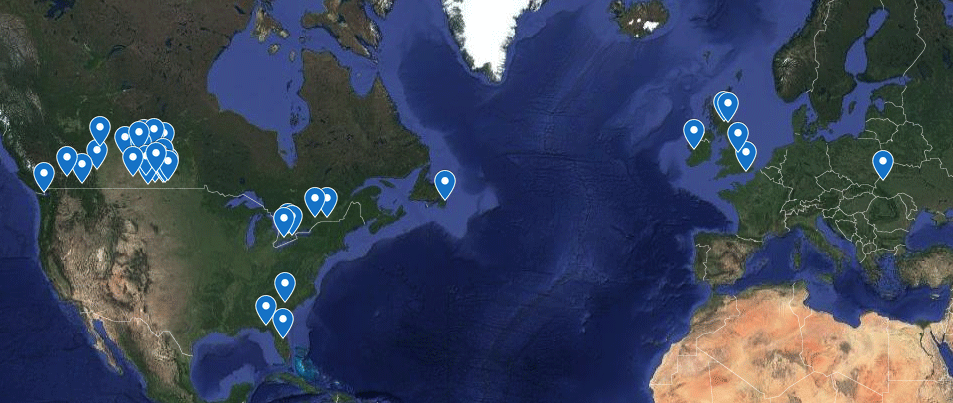Welcome
Dear Knowledge Network Members,
The 2021 Rural Dementia Summit was another adventure in virtual meetings. It was a steep learning curve last year but we were able to use that experience this year. The evaluations last year showed that many participants enjoyed the flexibility and accessibility of the virtual format so we had less anxiety about going virtual again this year. Thank you to everyone who contributed posters and presentations, who participated in the event, and who helped with the planning.
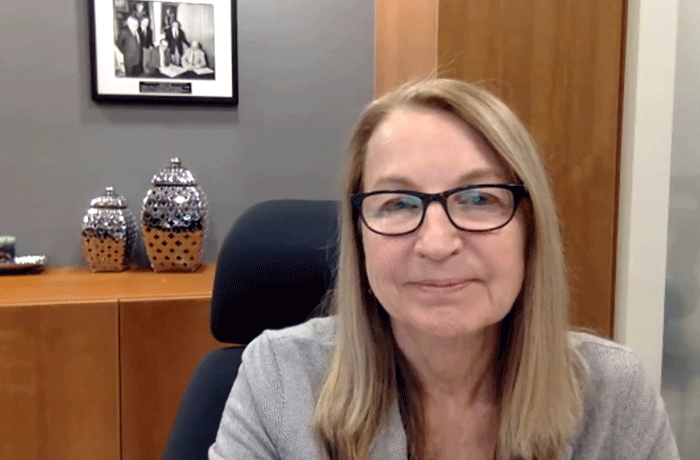
The Summit started 14 years ago as the RaDAR team’s strategy to engage face-to-face with people who share an interest in improving the quality of care and quality of life of people with dementia and their caregivers, who could provide direction to the RaDAR research program. This is still an important goal but over time the Summit has also come to serve as a community of practice and a hub for sharing dementia research and innovations taking place in Saskatchewan, other parts of Canada, and internationally.
This year our keynote speaker Dr. Fiona Marshall, from the UK, talked about farm-based care for individuals living with dementia. This alternative approach to day programs has been operating in Europe and the UK for many years, but is just beginning to happen in Canada. Her excellent presentation, which includes a brief video of a care farm, is available to view on the online Summit Session archive. Although the main focus of Summit is to highlight Saskatchewan-based research and programs, we also want to feature innovations taking place elsewhere. This year’s sessions included four other presentations by UK researchers (Eamon O'Shea, Ben Hicks, Andy Hyde, and Gosia Raczek), a presentation from the ACTS 2 Team in the USA, as well as diverse presentations from other parts of Canada. Two presentations were made by individuals living with dementia (Larry L., and Christine Thelker). We hope that everyone found something of interest in the program.
Thank you to everyone for making time to participate in the Summit and to complete the evaluation. We appreciate the very thoughtful and helpful feedback that you provided and will do our best to incorporate your recommendations in future Summits. The RaDAR team is excited to be able to bring people together to exchange knowledge and experiences, and work together to improve quality of life for people living with dementia and their families. Your engagement in the Summit makes this possible. We hope to see you again next year!
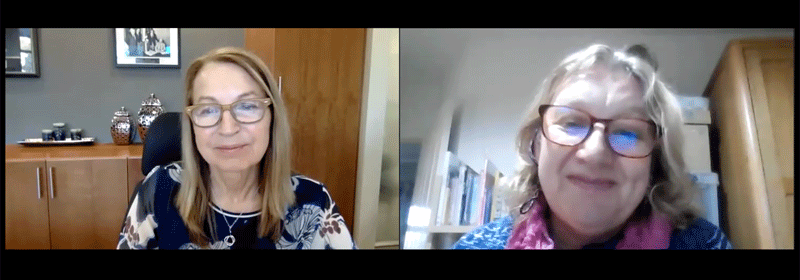
Dr. Fiona Marshall presented her keynote from the United Kingdom - view
her full presentation in the Summit Session Presentations section below
Bilokreli Family Support
Ongoing funding support for RaDAR via the Bilokreli Family Trust Fund has allowed the team to continue hosting Summit annually. The Summit helps to maintain a community of practice focused on rural dementia care anchored here in our province.
We appreciate the support the Bilokreli Family has provided to the RaDAR team since 2015, and their commitment to supporting dementia care in rural and remote communities. We are pleased to offer the Summit Student poster prizes in their name each year.
Poster Presentations
The online poster presentations were available a day in advance - on November 1 - to allow ample time for registered attendees to view the posters and interact with the presenters.
Below is an archive of the 23 Summit Poster presentations that were shared -- some presenters have chosen not to share the full content of their posters online. Email contact information is available for the presenters in case you would like to get in touch.
Within the full posters listing, we have highlighted the 4 student posters that were awarded Bilokreli Student Poster Prize awards for 2021
We're pleased to announce the winners of this year's Bilokreli Student Poster Prizes are as follows:
Third Place (tied): Kayley Lawrenz, and Erin Leeder
Second Place: Karl Grewal and Michaella Trites (co-authors)
First Place: August Kortzman
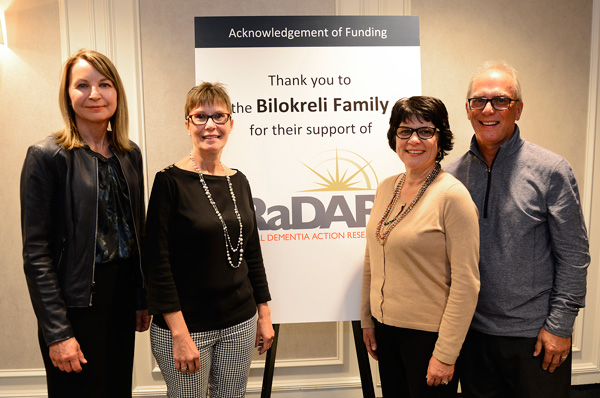
Nutrition Risk and Its Association with Dementia Diagnosis and Severity in Older Adults Referred to A Rural and Remote Memory Clinic.
Authors: Movassagh E, Morgan D, Kosteniuk J, O’Connell ME, Kirk A, Cammer A, Karunanayake C.
Presenter: Elham Movassagh with the RaDAR Team at the University of Saskatchewan
The Psychological and Social Wellbeing of Older Adults Living Alone with Cognitive Impairment.
Authors: Bayly M, O'Connell ME, Morgan D.
Presenter: Mel Bayly with the RaDAR Team at the University of Saskatchewan
RaDAR Memory Clinics in Rural Saskatchewan.
Authors: Kosteniuk J, Morgan D, O’Connell ME, Seitz D, Bayly M, Elliot V, Cameron C.
Presenter: Julie Kosteniuk with the RaDAR Team at the University of Saskatchewan
Bilokreli Student Poster Prize 2nd Place Poster
Diagnostic Classification & Dementia Severity in CVLT-II-SF Forced Choice Recognition: Implications for Effort Assessment.
Authors: Grewal K, Trites M, O'Connell ME, Morgan D, Kirk A, MacDonald SWS.
Presenters: Karl Grewal with the RaDAR Team at the University of Saskatchewan and Michaella Trites from University of Victoria.
Public Indoor Facility Audit: A project that encourages facilities in Yorkton to be more inclusive and accessible.
Authors: Washington L.
Presenter: Lisa Washington with the City of Yorkton
Needs Assessment: A project to assess the level of awareness business and community groups have in creating services and programs that are dementia-friendly.
Authors: Hryniuk S.
Presenter: Sheila Hryniuk
Belong Where You Find Yourself: A community-engaged art project at the Godfrey Dean Art Gallery.
Authors: Morton J.
Presenter: Jeff Morton director and curator, the Godfrey Dean Art Gallery, Yorkton, SK.
Community Changes Everything: Building Dementia Friendly Communities in Rural Saskatchewan.
Authors: Quennell L.
Presenter: Jackie Hofstrand with the Alzheimer Society of Saskatchewan
Bilokreli Student Poster Prize 3rd Place Poster *tie*
The Relationship Between Hand Grip Strength, Malnutrition Risk, and Cognitive Decline in a Memory Clinic Population.
Authors: Leeder E, Cammer A, Paterson P, O'Connell ME.
Presenter: Erin Leeder with the RaDAR Team at the University of Saskatchewan
We Hear You: Mobilizing knowledge about the experience of healthcare employees during the COVID-19 pandemic.
Authors: Hubbard Murdoch N, Nelson H, Hunter P, Wickson-Griffiths A.
Presenter: Natasha Hubbard Murdoch from Saskatchewan Polytechnic
Volunteers’ experiences building relationships with long-term care residents who have advanced dementia.
Authors: Pereira R, Myge I, Hunter P, Kaasalainen K.
Presenter: Rebeca Pereira a University of Saskatchewan student
Dementia Friendly Life Enrichment Program: Enhancing quality of life of individuals living with dementia in Yorkton and surrounding rural communities.
Authors: Washenfelder J.
Presenter: Jackie Washenfelder a quality of life supervisor with SaskAbilities Yorkton
Bilokreli Student Poster Prize 3rd Place Poster *tie*
The experience of COVID-19 in rural and Northern Saskatchewan long-term care homes.
Authors: Lawrenz K, Myge I, Pereira R, Hunter P.
Presenter: Kayley Lawrenz a student at the University of Saskatchewan
A bereavement care guide for LTC.
Authors: Myge I, Hunter P.
Presenter: Ivy Myge a clinical psychology PhD student at the University of Saskatchewan
Environmental scan of rural community programs that may be used by memory clinic patients/families.
Authors: Elliot V, Morgan D, Kosteniuk J, Bayly M, Cameron C, O'Connell ME.
Presenter: Valerie Elliot with the RaDAR Team at the University of Saskatchewan
Family Member Bereavement of Persons Living with Cognitive Impairment in Long-Term Care During the COVD-19 Pandemic.
Authors: Myge I, Pereira R, Ottley K, Qiao T, Compton RM, Hunter PV.
Presenter: Ivy Myge a clinical psychology PhD student at the University of Saskatchewan
We Hear You: Saskatchewan Healthcare Employee's Experiences of Work During a Pandemic.
Authors: Wickson-Griffiths A, Hunter P, Nelson H, Hubbard Murdoch N.
Presenter: Abigail Wickson-Griffiths, associate professor of Nursing, University of Regina
A variant of presenilin-1 associated with aging may also predispose to late-onset Alzheimer disease pathology.
Authors: Almendáriz-Palacios C, Wu CW, Eskiw CH, Mousseau DD.
Presenter: Darrell Mousseau, professor with the Department of Psychiatry, University of Saskatchewan
Partnering with family caregivers is a valuable way to encourage innovation and enhance trust in long-term care.
Presenter: Paulette Hunter, Department Head, St. Thomas Moore, University of Saskatchewan
Bilokreli Student Poster Prize 1st Place Poster
What makes an effective social support intervention? A systematic review.
Presenter: August Kortzman with the RaDAR Team at the University of Saskatchewan
An inside look at healthcare employee experiences of COVID- 19 pandemic in Saskatchewan: Qualitative results.
Presenter: Paulette Hunter Department Head, St. Thomas Moore, University of Saskatchewan
An inside look at staff burden and support during the first year of the COVID- 19 pandemic in Saskatchewan.
Authors: Hunter PV, Wickson Griffiths A.
Presenter: Paulette Hunter Department Head, St. Thomas Moore, University of Saskatchewan
Collaborating with rural-dwelling older men with dementia: Lessons for researchers and practitioners.
Author: Hicks B.
Presenter: Ben Hicks research fellow and manager of DETERMIND research program (UK)
Summit Session Presentations
The Summit began on November 2nd and all pre-recorded content was immediately available to attendees to view at any time. An agenda with suggested viewing order and times helped to organize the content. This mostly asynchronous delivery method was chosen to allow guests from other time zones, or with limited bandwidth, to watch and re-watch presentations at times convenient to them. Interaction with each presentation was through an embedded chat panel beside the presentation where attendees and the presenter could share comments and ask and answer questions.
The keynote presentation by Dr. Fiona Marshall, and some other sessions, were delivered live via Zoom Webinar and included a live Q&A session with the presenter. These live sessions were recorded to share for those unable to attend. As well, Dr. Allison Cammer led an interactive session with three live concurrent group discussions which attendees could join to share their feedback on developing areas of research in nutrition and dementia care.
Provided below the Summit 2021 agenda here are a stack of tabs with content from most of the Summit Session Presentations which were originally shared over the two days.
|
Day |
Start Time |
Session Name |
Type |
|
Tue, Nov 2 |
4:30 PM |
Welcome to Summit Online Platform |
Information |
|
|
|
RURAL SASKATCHEWAN - sessions i, ii, iii |
|
|
Tue, Nov 2 |
4:30 PM |
i) Pre-Recorded: Living with Dementia in Rural Long Term Care Facilities: The Nurse Experience using Non-pharmacological Interventions – presented by Virginia Deobald |
Pre-Recorded session |
|
Tue, Nov 2 |
4:45 PM |
ii) Pre-Recorded: Stigma of dementia and rural aging: Tackling the taboo – presented by Juanita Bacsu |
Pre-Recorded session |
|
Tue, Nov 2 |
5:00 PM |
iii) Pre-Recorded: Survey on Awareness and Knowledge of Dementia in Rural Saskatchewan – presented by Bonnie Jeffery |
Pre-Recorded session |
|
|
|
|
|
|
Tue, Nov 2 |
5:30 PM |
Pre-Recorded: Nutrition and Dementia: Potential Research Directions to be followed by LIVE discussion sessions to gather feedback about research questions – presented by Allison Cammer. |
Pre-Recorded session |
|
Tue, Nov 2 |
5:42 PM |
*LIVE* Discussion Session – Pick one of three questions from Allison Cammer’s presentation and join a focused, live Zoom discussion session to give your feedback on that topic. |
LIVE DISCUSSION SESSION |
|
Tue, Nov 2 |
6:47 PM |
*LIVE* Welcome to Summit 2021 and Poster Session Greetings – presented by Debra Morgan |
LIVE SESSION |
|
Tue, Nov 2 |
7:00 PM |
Poster Session - poster presenters have been asked to be online during this period to respond to messages about their posters |
Poster session |
|
Day |
Start Time |
Session Name |
Type |
|
Wed, Nov 3 |
8:30 AM |
Pre-Recorded: Welcome to Summit 2021 and RaDAR Team Updates -Presented by Dr. Debra Morgan |
Pre-Recorded session |
|
Wed, Nov 3 |
9:02 AM |
*LIVE* Keynote: Towards Meaningful Dementia Care in Rural Communities – Presented by Fiona Marshall [UK] |
LIVE SESSION |
|
RURAL INTERNATIONAL – sessions 1, 2, & 3 |
Information |
||
|
Wed, Nov 3 |
9:45 AM |
1) Pre-Recorded: Resource allocation for people with dementia living in rural areas in Ireland – presented by Eamon O’Shea [Ireland] |
Pre-Recorded session |
|
Wed, Nov 3 |
10:00 AM |
2) Pre-Recorded: Impact of rurality on people with dementia and their care partners during the COVID-19 pandemic: Findings from the DETERMIND study – presented by Ben Hicks [UK] |
Pre-Recorded session |
|
Wed, Nov 3 |
10:15 AM |
3) Pre-Recorded: Rural and urban differences in the quality of care in persons with dementia: a systematic review– presented Genevieve Arsenault-Lapierre |
Pre-Recorded session |
|
|
|
|
|
|
Wed, Nov 3 |
10:32 AM |
*LIVE* Lived Experiences Panel – Larry L and Laura Erickson-Lumb |
LIVE SESSION |
|
Wed, Nov 3 |
ADVOCACY AND INNOVATION - sessions A, B, & C |
Information |
|
|
Wed, Nov 3 |
11:00 AM |
A) Pre-Recorded: Designing better journeys with people with dementia – presented by Andy Hyde (Scotland) |
Pre-Recorded session |
|
Wed, Nov 3 |
11:15 AM |
B) Pre-Recorded: Dementia through a Lens of Human Rights – presented by Christine Thelker |
Pre-Recorded session |
|
Wed, Nov 3 |
11:30 AM |
C) Pre-Recorded: Going missing in rural communities: Preventative strategies to reduce the risks of getting lost among persons living with dementia – presented by Noelannah Neubauer |
Pre-Recorded session |
|
|
|
|
|
|
Wed, Nov 3
|
11:45 AM |
Pre-Recorded: Alzheimer Society of Saskatchewan Update – presented by Melody Neufeld and Barb Ulmer |
Pre-Recorded session |
|
Wed, Nov 3 |
12:02 PM |
*LIVE* Supporting Rural-Dwelling African American Dementia Caregivers - ACTS2 Research Team [USA] |
LIVE SESSION |
|
|
|
BRAIN CHANGES AND MEMORY ASSESSMENT - sessions i, & ii |
Information |
|
Wed, Nov 3 |
12:30 PM |
i) Pre-Recorded: Remote memory assessment in times of COVID-19 restrictions - a study of patient and clinician experience – presented by Gosia Raczek [UK] |
Pre-Recorded session |
|
Wed, Nov 3
|
12:45 PM |
ii) Pre-Recorded: Alzheimer's disease - What's going on in the brain? – presented by Andrew Kirk |
Pre-Recorded session |
|
Wed, Nov 3 |
1:05 PM |
Thank You - End of Summit Meeting and Evaluation |
Information |
Presenter Virginia Deobold, a RaDAR team trainee, provided this session.
Get in touch with the presenter: virginia.deobald@usask.ca
Dr. Juanita Bacsu, a post doctoral fellow working with the RaDAR Team at the University of Saskatchewan, presents this session focused on the stigma of dementia and rural aging.
You can follow Dr. Bacsu on Twitter, or follow her project's page on Facebook.
Get in touch with the presenter: juanita.bacsu@usask.ca
Dr. Bonnie Jeffery, professor at the University of Regina, and researcher with Saskatchewan Population Health and Evaluation Research Unit (SPHERU) is the presenter of this session about survey results collected as part of a larger 5-year research project.
Dr. Jeffery's team has a website, Twitter profile, and Facebook page you can explore to learn more about their work.
Five community-based organizations who have partnered with Dr. Jeffery and her team submitted posters to the Summit this year. View them in the poster sessions archived on this page to learn more about the work being undertaken.
Want to learn more, get in touch with presenter: bonnie.jeffery@uregina.ca
This was a special, pre-recorded session by RaDAR Team investigator, Dr. Allison Cammer to help set research priorities, and collect feedback from Summit participants.
The recorded presentation was provided as background information before attendees then chose one of three interactive discussion groups to join for a live discussion. For this reason, the presentation is not shared here on this archive.
Get in touch with the presenter: allison.cammer@usask.ca
This session was originally offered live as a Zoom Webinar - the video posted is a recording of the session.
Dr. Debra Morgan, RaDAR Team Lead, welcomed all attendees to Summit 2021, and introduced the evening poster session which started the first evening of Summit.
Get in touch with the presenter: debra.morgan@usask.ca
To begin the second day of the Summit meeting, Dr. Debra Morgan provided an overview of the history of the RaDAR team and the Summit event, and gave an update on current RaDAR team projects.
In her presentation, Debra mentions the change to remote-delivery for the Rural and Remote Memory Clinic at the University of Saskatchewan due to Covid-19, as well as updates about the Rural Primary Healthcare Memory Clinics.
Get in touch with the presenter: debra.morgan@usask.ca
This session was originally offered live as a Zoom Webinar - the video posted is a recording of the session.
Dr. Fiona Marshall, from the University of Notthingham, [UK], and Director of Flourish Rural Derbyshire CIC provided this keynote presentation.
Get in touch with the presenter: fiona.marshall2@nottingham.ac.uk
Dr. Eamon O'Shea, a professor at National University of Ireland, Galway and the Director of the Centre for Economic and Social Research on Dementia (CESRD) [Ireland] is the presenter for this session.
Follow CESRD on Twitter.
Get in touch with the presenter: eamon.oshea@nuigalway.ie
Dr. Ben Hicks, is a Research Fellow in Dementia Studies, and manager of the ESRC/NIHR funded DETERMIND research programme. In this session he presents on findings from DETERMIND, a 5-year longitudinal study that seeks to examine and address the inequalities and inequities in the post-diagnostic care pathway for newly diagnosed people with dementia and their care partners.
Follow the DETERMIND study on Twitter.
Get in touch with the presenter: b.hicks@bsms.ac.uk
Geneviève Arsenault-Lapierre, Senior Research Associate with the Research on Organization of Healthcare Services for Alzheimers (ROSA) team, and member of CCNA Team 19 presents this session.
Follow Geneviève on Twitter.
Get in touch with the presenter: genevieve.arsenault-lapierre@mail.mcgill.ca
Andy Hyde, founder of Go Upstream, presents this session about designing better travel experiences for people with dementia in Scotland.
Follow Andy on Twitter, and learn more at the Go Upstream project website.
Get in touch with the presenter: hello@upstream.scot
Christine Thelker, a board member of Dementia Advocacy Canada and a person living with dementia, presents this session about dementia and human rights.
Follow Christine on Twitter and Facebook.
Get in touch with the presenter: chrissythelker2019@gmail.com
Session presenter Dr. Noelannah Nuebauer, is a Postdoctoral Fellow at University of Waterloo with the Aging and Innovation Research Program. Dr. Neubauer is also a co-founder of the International Consortium on Dementia and Wayfinding (ICDW).
Follow Dr. Neubauer on Twitter.
Get in touch with the presenter: noelannah.neubauer@uwaterloo.ca
Melody Neufeld and Barb Ulmer with the Alzheimer Society of Saskatchewan provide an overview of the agency's programming, including on-line programming.
Follow the Alzheimer Society of Saskatchewan on Twitter.
This session was originally offered live as a Zoom Webinar - the video posted is a recording of the session.
Members of the African-American Alzheimer's Caregiver Training and Support Project 2 (ACTS 2) team: Dr. Xan Nowakowski, Tomeka Norton-Brown, Nik Lampe, and Dr. Rob Glueckauf joined us LIVE to share information about their project, and answer questions from the attendees with Dr. Debra Morgan moderating.
Learn more about the ACTS 2 Project.
Get in touch with the presenters through Dr. Xan Nowakowski: xnowakowski@fsu.edu
Dr. Gosia Raczek, from the Centre for Dementia Studies, Brighton and Sussex Medical School [UK] is the presenter for this session.
Get in touch with the presenter: G.Raczek@bsms.ac.uk
Dr. Andrew Kirk, Neurologist and RaDAR team investigator, is the presenter for this session.
Get in touch with the presenter: andrew.kirk@usask.ca
Event Evaluation
Attendees could rate and provide feedback on each session as they attended. This information was anonymized and shared back with individual session presenters.
All Summit attendees were encouraged to complete a post-event evaluation of their entire Summit experience, with an incentive prize drawn from all who completed the survey.
The 2021 incentive draw winners were Chantelle E. and Kathy S. who each received a $50 Visa gift card.
The Summit 2021 online platform recorded that of the 159 initial registrants, 129 attendees logged in to attend this year. 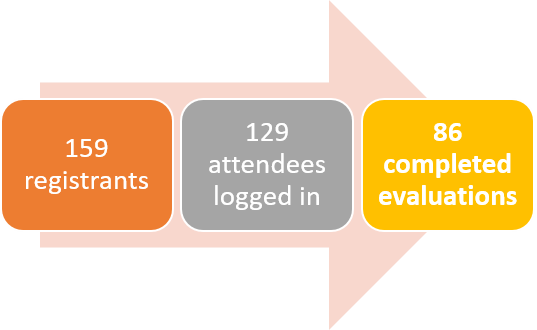 Eighty-six attendees completed the post-event Evaluation Survey. We're happy to share a summary of what we learned from the survey.
Eighty-six attendees completed the post-event Evaluation Survey. We're happy to share a summary of what we learned from the survey.
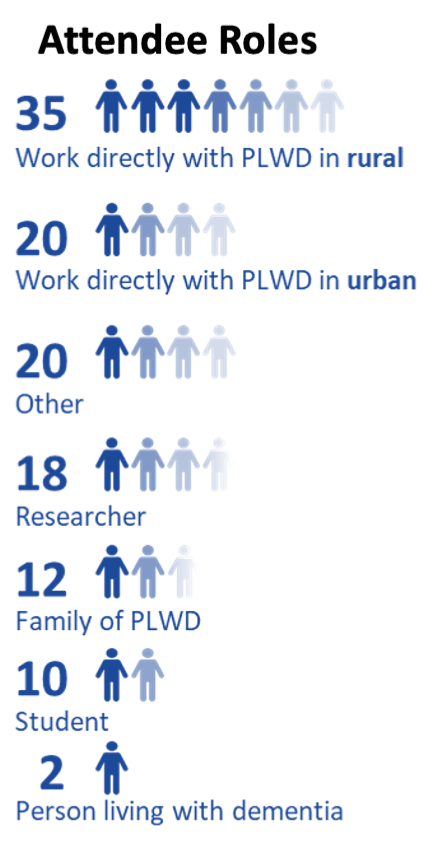
-Attendees represented a wide variety of backgrounds: the role that each attendee self-declared on the evaluation are shown to the right. Note that attendees could choose multiple roles, and therefore the sum of roles in this chart exceed the number of attendees.
-Summit 2021 hosted new and returning folks: 33% of attendees were first-time Summit participants, 67% had been to at least one previous Summit.
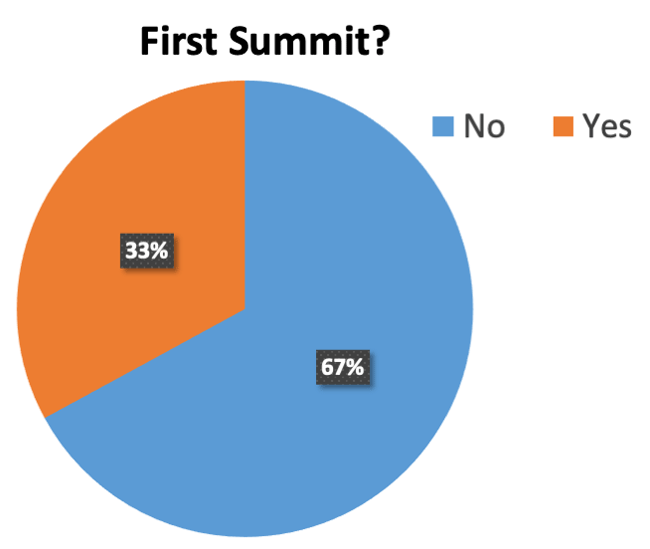
-Attendees rated the Poster Session favourably, on a number of measures:
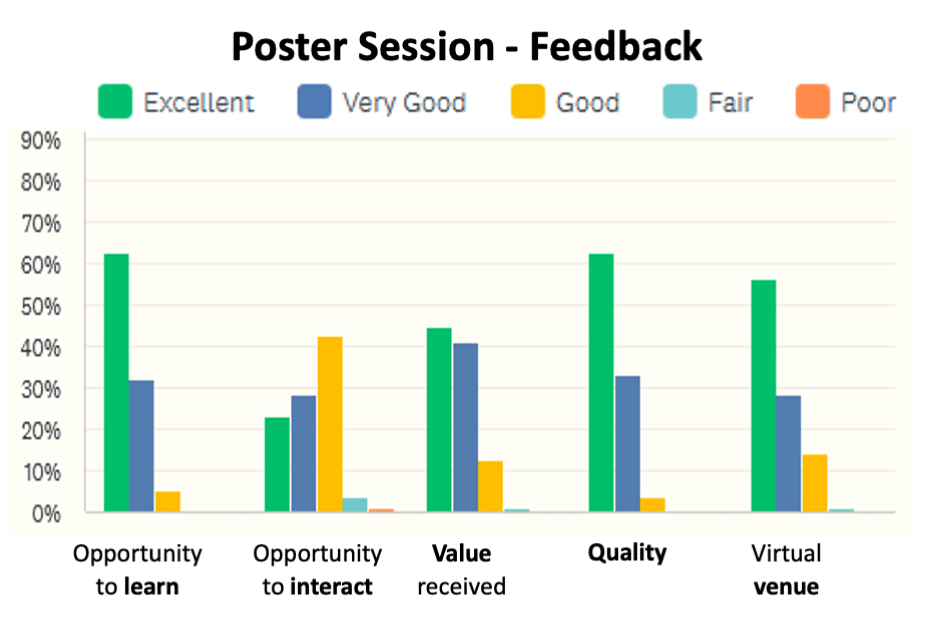
-Attendees reported high levels of satisfaction with other aspects of the online Sessions and meeting format:
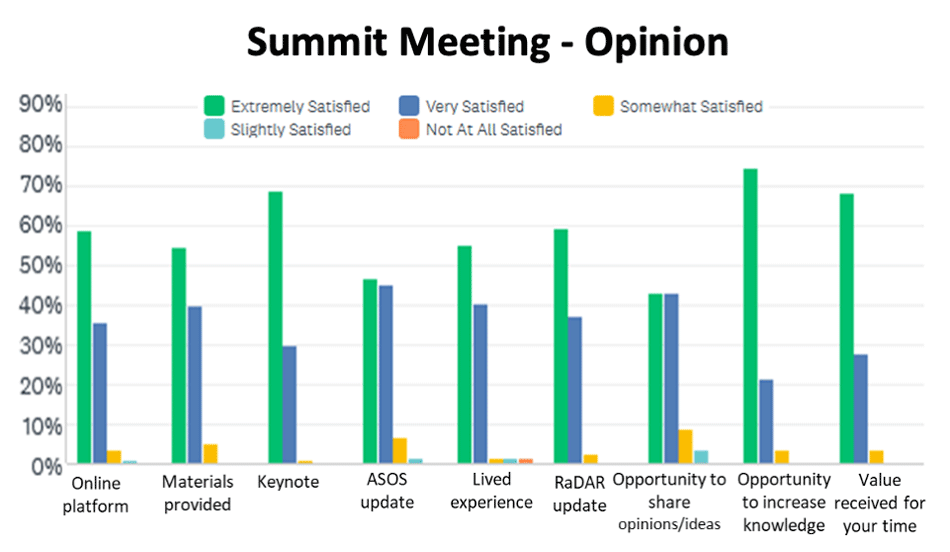
The evaluation also included open-ended questions about attendees experiences of the event.
Echoing what heard from 2020, in the feedback received this year attendees reported appreciating the online format of the Poster Sessions. While it was noted that the virtual format lacked the oportunity for face-to-face discussion, overall the online format was given praise for participant's ability to spend as much time as needed to review poster content, and interact with the presenters via the chat panel. The short video poster presentation recorded by the presenter of each Poster Session was very much appreciated, and it has been suggested that RaDAR consider incorporating this format at future, in-person events.
About the Summit event overall we heard positive feedback:
- the flexibility to participate from home/office as able, without need to travel or incur additional expenses like hotel or meals costs
- the technology worked well, and the site was well organized with good communication between Summit organizers and attendees
- appreciated the safety of the on-line format being offered again, during continuing COVID-19 pandemic
We also heard some feedback about how we could improve, or about what was missing from Summit this year:
- lack of personal face-to-face interaction with others
- an online-only event, for some, didn't provide the immersive environment that an in-person event would: too easy to be distracted by other work/life interuptions while trying to attend from a computer
- on-line platform is difficult to navigate for people living with dementia
The RaDAR team uses the feedback we receive from the Summit evaluation survey to help us plan for the next Summit, and to better-deliver other on-line events.
Credit for survey response charts adapted for this page belongs to RaDAR team member Valerie Elliot.
We're pleased to share some quotes from attendees with you, direct from the evaluation survey feedback:
"Thank you for organizing the conference and for all of the technical support provided to make presenting and attending a wonderful experience!"
"I really liked the pre-recorded sessions because it provided a lot of time flexibility which allowed me to maximize my learning. I also really enjoyed the live discussion groups over zoom, I found that this was a great way to connect and brainstorm with other attendees."
[commenting on the Poster Session] "These presentations reach a wide range of people who otherwise would not be aware of most of it. It was great to see a lens turned toward LTC facilities as perhaps it will enable change for staff, clients and families."
"I loved the presentations that went along with the poster sessions. In live events, you read the info, but often don't take time to ask or learn further. This was a really excellent piece. "
"I love how the posters evolve each year. This year there were plenty that delved into the day to day challenges that people with dementia and caregivers face such as transport, long term care, nutrition "
"An eye opening experience of how much interest there is in Dementia and dementia care. Often feels like there is nothing available for folks in the north, or in remote rural communities. "
"International perspective and focus on rurality and dementia. A very warm supportive environment with delegates genuinely wanting to make a difference. "
[commenting on what the Summit provides] "An annual rural dementia hub with a range of stakeholders (policymakers, practitioners, researchers, people with dementia, etc.) where we can all come together to learn, share ideas, and develop innovations for moving forward to improve QoL for people with dementia and their care partners."
"It provides a unique opportunity to connect with a range of stakeholders - the Summit retains a very "personal" feel - even as a virtual event - which I appreciate. Very good quality research, posters, and presentations."
" . . . I feel that I have tools that I have gained that I will implement into my primary care practice routinely. Namely discussing nutrition with my dementia patients, and also continuing to look for ways we can provide services to my rural dementia patients."
"I learned about a few new services available in Saskatchewan and made contact with service providers that I will continue to use in my work. Increased my knowledge about dementia and dementia care. I will be reaching out to a few presenters to obtain copies of resources that I believe I will use when working with clients."
"New ideas and innovations for moving forward with my research as I transition towards an academic career."
"I think I am getting used to online conferences/learning ... I may even prefer ... definitely decreases carbon footprint . . . enjoy the flexibility of pre-recorded sessions, reviewing posters on my own."
"The chance to connect with national and international researchers on rural dementia. The chance to learn more about research I had not thought about before and to make connections (for example, that by designing for people with dementia there can be downstream positive effects for people with other disablities)."
"Easy to attend flexibly (e.g., can catch up a few emails here and there vs. committing fully). Great way to review poster presentations. Great way to hear more international voices . . . Reduced need to try to clear a workday to attend since there is some flexibility in timing"
Summit Games Prizes
To encourage online networking between participants, and to increase engagement with the Summit content, we included two rounds of Summit Games over the two days. Attendees could earn points for finding clues within the online platform and session content, and could earn points for participating in the discussion forums and the session-specific chat panels.
Competition between participants was high this year, and Tuesday's top three participants proved to be strong players on Wednesday as well!
The winners of the Tuesday Summit games were:
| 1st Place | 2nd Place | 3rd Place |
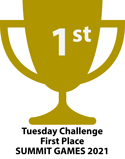 |
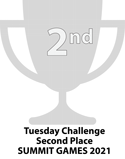 |
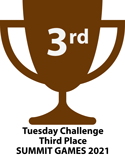 |
| Arianna B. | Nina N. | Angelique S. |
The winners of the Wednesday Summit games were:
| 1st Place | 2nd Place | 3rd Place |
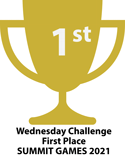 |
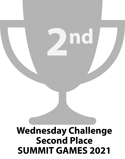 |
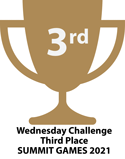 |
| Arianna B. | Nina N. | Angelique S. |
Summit Attendees Map
During the registration process, we asked attendees if we could pin their location on a world map which was shared on the online platform. It was wonderful to see the variety of the locations from which attendees were joining.
